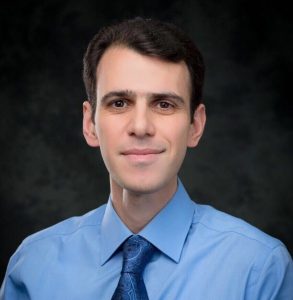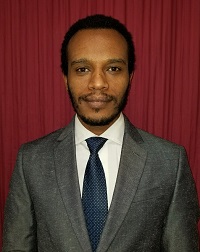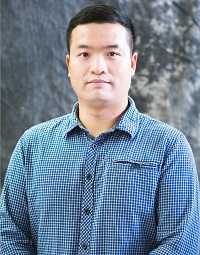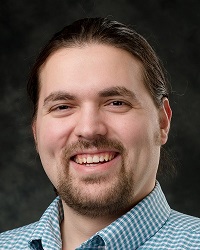John “Moose” Henderson
Forest Science
As a self-financed student, the fellowship gave me the funds to complete my degree without working full time.
John “Moose” Henderson
Forest Science
As a self-financed student, the fellowship gave me the funds to complete my degree without working full time.
Aref Majdara
Electrical Engineering
 I came to Michigan Tech in August 2013 to pursue my PhD in Electrical Engineering. I completed my Bachelor’s and Master’s degrees in my home country, Iran.
I came to Michigan Tech in August 2013 to pursue my PhD in Electrical Engineering. I completed my Bachelor’s and Master’s degrees in my home country, Iran.
My PhD research is focused on developing computationally efficient algorithms for non-parametric high-dimensional density estimation, with applications in density-based data mining and machine learning techniques.
Besides research activities, since Fall 2014, I have been working as a Graduate Teaching Assistant, and I had the opportunity to teach five different ECE labs during seven semesters, which has been an invaluable experience for me.
I am truly grateful to the Graduate School for providing me with financial support through the Doctoral Finishing Fellowship. This fellowship has made it possible for me to put my entire focus on publishing my research and completing my thesis, towards completion of my PhD degree this semester.
I would also like to express my sincere gratitude and appreciation to MTU Alumni and Friends, for making this fellowship possible through their generous donations.
Gemechis D. Degaga
Chemistry
 Before I came to Michigan Tech, I earned my BSc. degree in Physics from Haramaya University and MSc. degree in Materials Science from Addis Ababa University, both in Ethiopia. I then earned another MSc. degree in Physics from the University of Trieste (Università degli studi di Trieste) in Italy through the two-year TRIL Masters Fellowship, awarded from the International Center for Theoretical Physics (ICTP). I am currently a PhD candidate in the Chemistry Department. I joined Dr. Loredana Valenzano’s research group in the Fall of 2013. Since then I have conducted multiple PhD projects involving coordinative polymers (CPO-27) also known as Metal Organic Frameworks (MOF-74-Mg/Zn). Results of my DFT studies on the adsorption and diffusion of hydrocarbon molecules showed that MOF-74-Mg/Zn are energetically and economically promising materials for olefin-paraffin gas mixture separation, for application in petroleum refining industries. In my final project, I applied crystal engineering principles to improve the physicochemical properties of active pharmaceutical ingredient (API) co-crystals such as solubility, dissolution rate, hygroscopic stability, compressibility, and bioavailability to obtain better compatibility for human use. From these research project results, I was able to publish three peer-reviewed papers and conducted multiple poster and oral presentations on campus and at national and international conferences.
Before I came to Michigan Tech, I earned my BSc. degree in Physics from Haramaya University and MSc. degree in Materials Science from Addis Ababa University, both in Ethiopia. I then earned another MSc. degree in Physics from the University of Trieste (Università degli studi di Trieste) in Italy through the two-year TRIL Masters Fellowship, awarded from the International Center for Theoretical Physics (ICTP). I am currently a PhD candidate in the Chemistry Department. I joined Dr. Loredana Valenzano’s research group in the Fall of 2013. Since then I have conducted multiple PhD projects involving coordinative polymers (CPO-27) also known as Metal Organic Frameworks (MOF-74-Mg/Zn). Results of my DFT studies on the adsorption and diffusion of hydrocarbon molecules showed that MOF-74-Mg/Zn are energetically and economically promising materials for olefin-paraffin gas mixture separation, for application in petroleum refining industries. In my final project, I applied crystal engineering principles to improve the physicochemical properties of active pharmaceutical ingredient (API) co-crystals such as solubility, dissolution rate, hygroscopic stability, compressibility, and bioavailability to obtain better compatibility for human use. From these research project results, I was able to publish three peer-reviewed papers and conducted multiple poster and oral presentations on campus and at national and international conferences.
While at Michigan Tech I had opportunities to be involved in research and teaching activities within the Physics Department. Michigan Tech has provided me an environment in which I was able to take on leadership commitments such as Graduate Student’s Government (GSG) academic committee member and as a Chemistry Department representative. I also learned a lot from the professional development seminar series and many other seminars conducted through the Graduate School. I am grateful to the Graduate School and the Dean’s Advisory Panel for providing me with the Finishing Fellowship. This fellowship allows me the opportunity to focus on writing my dissertation and complete it in a timely manner.
![]() To all graduate students in STEM and related fields:
To all graduate students in STEM and related fields:
Applications are now open for ComSciCon 2018, the 6th annual Communicating Science workshop, to be held in Boston, MA on June 14-16th 2017. Graduate students at U.S. and Canadian institutions in all fields of science, technology, engineering, health, mathematics, and related fields are encouraged to apply. The application will close on March 1st.
Acceptance to the workshop is competitive; attendance is free and travel support and lodging will be provided to accepted applicants.
Chaofeng Wang
Electrical Engineering
 My name is Chaofeng Wang and I am currently a Ph.D. candidate at Michigan Tech majoring in Electrical Engineering. My research interests lie in the areas of signal processing, communications, and machine learning, with the recent focus on statistical learning for underwater acoustic communications. My research goal is to improve the performance of underwater acoustic network systems from various perspectives such as security, throughput, and energy consumption, by adopting advanced signal processing and machine learning techniques.
My name is Chaofeng Wang and I am currently a Ph.D. candidate at Michigan Tech majoring in Electrical Engineering. My research interests lie in the areas of signal processing, communications, and machine learning, with the recent focus on statistical learning for underwater acoustic communications. My research goal is to improve the performance of underwater acoustic network systems from various perspectives such as security, throughput, and energy consumption, by adopting advanced signal processing and machine learning techniques.The learning experience at Michigan Tech helps me learn how to solve problems and overcome challenges, which can benefit both my personal development and future career. It is my honor to receive the finishing fellowship and I greatly appreciate the support from the Graduate School.
Meng Tang
Mechanical Engineering-Engineering Mechanics
Gorkem Asilioglu
Computer Science
 I came to Michigan Tech in Fall 2011 to work on my PhD in Computer Science. Even prior to my arrival at Tech, I had been working on computer architecture research. With guidance from my advisor, Dr. Soner Onder, I focused my efforts toward dynamic dependency collapsing. At Tech, I had the opportunity to work on many interesting research problems in defining and exploiting dependent parallelism in code as well as publish my design and results in the top conference in my field (ISCA). In addition to working on research, I had the opportunity to serve Michigan Tech and the Computer Science Department’s teaching mission by instructing a number of classes.
I came to Michigan Tech in Fall 2011 to work on my PhD in Computer Science. Even prior to my arrival at Tech, I had been working on computer architecture research. With guidance from my advisor, Dr. Soner Onder, I focused my efforts toward dynamic dependency collapsing. At Tech, I had the opportunity to work on many interesting research problems in defining and exploiting dependent parallelism in code as well as publish my design and results in the top conference in my field (ISCA). In addition to working on research, I had the opportunity to serve Michigan Tech and the Computer Science Department’s teaching mission by instructing a number of classes.Ashok Khanal
Chemistry
I received my Master’s degree in organic chemistry from Nepal. The final touch that shaped my interest in organic chemistry came after studying different iconic organic reactions and synthesis that had pushed the limit of human endeavors to synthesize molecules to catch up with the escalating need of drug, and brought new avenues in the field of chemistry. I began my PhD at Michigan Tech in Jan 2012. I published different papers in peer-reviewed journal. My research focuses on stepwise solid phase synthesis of PEGs and measurement of mechanical force of single covalent bond.
The Portage Health Foundation fellowship helps me to write my dissertation. I would like to thank my advisor, Graduate School and Portage Health Foundation for the achievement.
I came from China in January 2013, and joined Dr. Lanrong Bi’s group in the Department of Chemistry at Michigan Tech. My research focuses on the design and synthesis of fluorescent dyes. These fluorescent dyes could target and label the organelles, thus shining light on cell’s inner workings. When these dyes work, we can see a glowing image of the organelle, thus helping us to detect unhealthy cells. My ultimate goal is to see our probes becoming commercially available at affordable price, improving health of countless people and benefiting the society.
Thanks to the Portage Health Fellowship, I will be able to focus on my research so that I could expect to graduate sooner. I want to give my sincere thanks to Portage Health Foundation and Graduate School. I am also thankful to my advisor and alumni donors for this fellowship.
The Graduate School is pleased to announce the awarding of Finishing Fellowships for doctoral candidates. Fellowships are available through the generosity of alumni and friends of the University. They are intended to recognize outstanding PhD candidates who are in need of financial support to finish their degrees.
(listed by nominating department)
Biochemistry and Molecular Biology
Jeffrey Kiiskila
Biological Sciences
Andrew Chapp
Chemistry
Gemechis Dereje Degaga
Ashok Khanal
Shanshan Hou
Computer Science
Gorkem Asilioglu
Zhaoxiang Jin
Electrical Engineering
Aref Majdara
Husam Sweidan
Chaofeng Wang
Forest Science
John Henderson
Geophysics
Marine Foucher
Mechanical Engineering-Engineering Mechanics
Kishan Bellur
Meng Tang
Le Zhao
Xiucheng Zhu
Saeedeh Ziaeefard
Physics
Meghnath Jaishi
Dolendra Karki
Mingxiao Ye